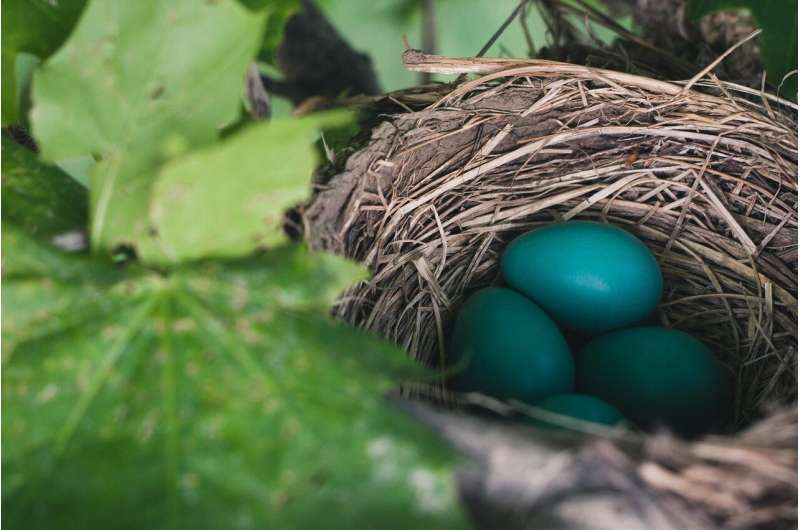Scientists, experts stumped at what's killing songbirds: 'It's frustrating'

A group of songbirds recently turned up dead in Nottingham, Chester County, Pennsylvania.
But their cause of death is a mystery for scientists, wildlife officials, and bird lovers. Scores of similar bird deaths have been reported in 27 Pennsylvania counties, including Philadelphia, since June. And more and more deaths have been logged in Delaware and eight other states and Washington, D.C. stretching back to April.
Officials and wildlife experts are stumped by the illness and deem the rash of deaths unusual. They are pleading with the public to stop feeding birds from feeders and providing water in bird baths until the cause is found, as they believe congregating birds may contribute to the malady's spread.
The illness is killing a range of species, all of which have been found with ocular and neurologic issues. The disorder is marked by swollen eyes with a crusty discharge, and erratic flight and stumbling.
Officials say cases have been reported in Tennessee, Kentucky, Virginia, West Virginia, Maryland, Indiana, Ohio and Florida.
Lisa Murphy, a veterinarian and associate professor at Penn's School of Veterinary Medicine, called the illness "worrisome." She is co-director of Penn's Wildlife Futures Program, and director of the Pennsylvania Diagnostic Laboratory System at New Bolton Center in Kennett Square, Chester County. The lab has been performing autopsies and toxicology tests on affected birds, and is coordinating with labs and wildlife centers in other states.
"Not one disease or disease agent jumps," Murphy said. "This does seem to be something unique and unusual."
Avian influenza has been ruled out, as have other viral and bacterial diseases. No poison, toxin or parasite has been identified as a cause.
"As this unfolds, it is becoming a complicated puzzle," Murphy said.
The Pennsylvania Game Commission is recommending that people clean all feeders and baths with a 10% bleach solution, and avoid handling birds. People finding dead birds should wear disposable gloves and place the birds in a sealable plastic bag and discarded with household trash, which prevents disease transmission to other birds and wildlife.
Pennsylvania officials are asking people to report occurrences of bird deaths online to the Wildlife Futures Program. Experts from the program and state game commission are investigating more than 85 reports from the public of songbirds that are sick or dying. Of those reports, 15 occurred in Philadelphia, Bucks, Montgomery, and Chester counties.
Species affected so far are Blue jay, European starling, common grackle, American robin, Northern cardinal, house finch, house sparrow, Eastern bluebird, red-bellied woodpecker, Carolina chickadee, and Carolina wren. The malady appears to affect juvenile birds more than adults.
The Delaware Department of Natural Resources and Environmental Control (DNREC) said it has observed similar symptoms in the state's avian population and more than 50 dead birds have been reported. DNREC has also sent samples to Murphy's lab and is asking residents who see a live bird exhibiting symptoms to call Tri-State Bird Rescue & Research at 302-737-9543. However, residents finding a dead bird that they suspect displayed any of the symptoms should contact the DNREC Division of Fish and Wildlife at 302-735-3600.
There are no official reports yet of similar bird deaths in New Jersey.
Lisa Smith, executive director of Tri-State Bird Rescue & Research, said they have about 30 birds with symptoms of the disease, mostly in Delaware, but several in Maryland as well as Chester County.
She said there was a similar disease in the mid-1990s, known as "Finch Eye Syndrome" because it was found in house finches with swollen and crusty eyes. In that case, the bacterium, Mycoplasma gallisepticum, was identified as a cause. It does not appear to be the cause of the current outbreak.
"When a new disease appears, there is always concern, especially until the cause is identified," Smith said.
The good news, she said, is that, the disease has so far been limited to a relatively small number of species and does not appear to be spreading among more species and ages. In addition, it appears to be subsiding in the Washington, D.C. area, where it seems to have originated.
Keith Russell, program manager for urban conservation at Audubon Mid-Atlantic, said he first started hearing of the outbreak in early spring, and has been following it closely.
"The troubling thing in our area is we ... haven't been able to pinpoint the infectious agent, which is worrisome," he said. "Disease is as potent a problem in the birds in the wild as it is for people, just like the coronavirus. Could this turn into an massive epidemic that hurts or kills massive numbers of birds? We just don't know."
©2021 The Philadelphia Inquirer, LLC.
Distributed by Tribune Content Agency, LLC.
















